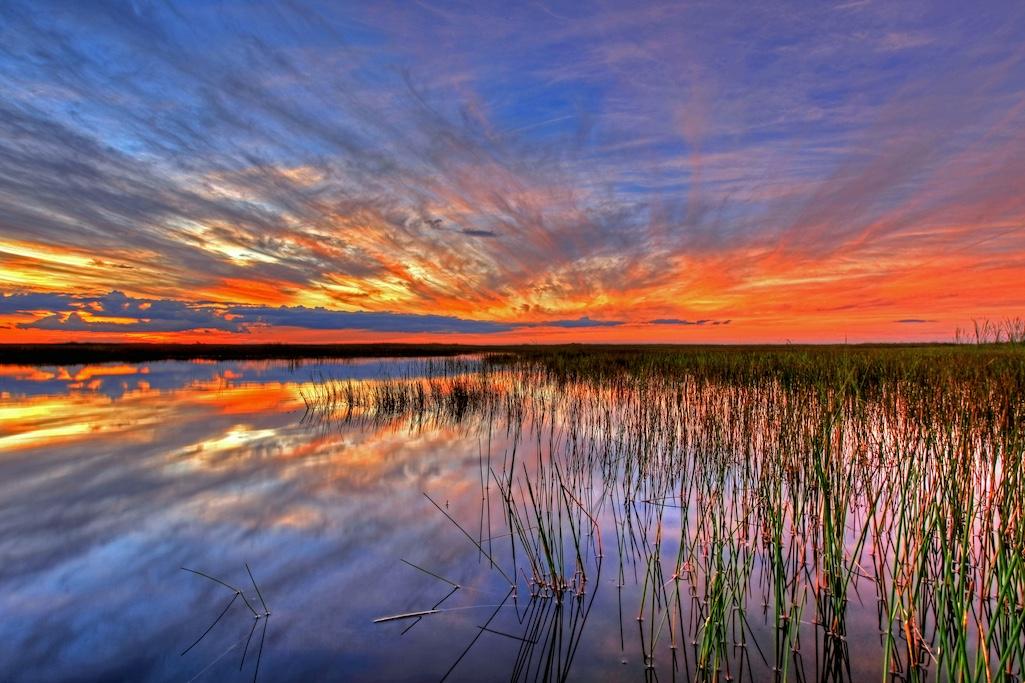
New polling shows strong majorities in Florida support Everglades restoration and efforts to protect against climate-change impacts/NPS file
New polling in Florida shows strong, bipartisan support for the ongoing Everglades restoration program and efforts to mitigate climate-change impacts.
The survey, done by Florida Atlantic University for the National Parks Conservation Association, found that 89 percent of the state's residents value conservation of the state's natural resources, 86 percent believe state leaders should protect and restore the Everglades' ecosystem, and 85 percent want to see climate-change solutions to protect the state's natural resources.
"Florida’s national parks, which protect our iconic waterways and unique wildlife, are the lifeblood of our state. This new polling shows just how deeply Floridians revere the River of Grass ecosystem, which provides us with clean drinking water and bountiful outdoor recreation opportunities," said Cara Capp, the NPCA's senior Everglades program manager. "Across the board, these findings from the Florida Atlantic University Business and Economics Polling Initiative show stunning support for our parks."

The polling was collected in two phases: One, statewide, and a second focused on voters in Miami-Dade County. Of the 1,000 voters called, 34 percent identified themselves as Republicans, 30 percent as Democrats, and 27 percent as Independents.
“Across party lines, national park advocates in Florida understand that bold action is needed to protect our parks and communities from climate change, overdevelopment, and extractive industries," Capp noted. "From restoring America’s Everglades to protecting our coral reefs in Biscayne National Park and our critical wetlands at Big Cypress National Preserve, the time for that bold action is now. National parks in Florida are worth fighting for. This is our home, and we will stand up for it when we need to.”
Results of the survey, conducted in March, reflect not only strong support in general for protecting Florida's natural resources, but specific support for increasing protection of the Florida Reef Tract, using marine protected areas as a conservation tool, and protecting national parks from oil exploration and mining.
In the case of ongoing efforts to find recoverable oil reserves in Big Cypress National Preserve, 81 percent of the statewide pool of respondents either somewhat agreed (23.2 percent) or strongly agreed (57.8 percent) that the preserve should be fully restored from damages inflicted by recent oil exploration and protected against industrial oil development with its boundaries. In the Miami-Dade County polling, nearly 73 percent took those positions.
There have been ongoing battles in the state over how the national parks there are managed, from disagreement over how much of Big Cypress should be designated as official wilderness and made off-limits to motorized vehicles to whether a marine protected zone in Biscayne National Park should be created to protect the coral reef that runs through the park's waters. Just last month a federal judge ordered the National Park Service to protect 6 percent of Biscayne as a Marine Protected Zone, a proposal the agency raised nine years ago.


The long-running Comprehensive Everglades Restoration Program (CERP) has seen the state and federal governments spend billions of dollar to improve the flow of the "river of grass" that runs from Lake Okeechobee all the way south to Florida Bay, running through Big Cypress and Everglades National Park along the way.
The Everglades wetlands span nearly 3 million acres, and within that are the 1.5 million acres of Everglades National Park and its 1.3-million-acre Marjory Stoneman Douglas Wilderness, the largest wilderness area east of the Rockies. But the landscape has been under siege almost since the first developers and large-scale farm operations reached South Florida and brought with them plans to divert or dam the water that flows south from Lake Okeechobee. All those efforts down through the decades altered the Everglades by changing its natural processes.
The CERP has called for surface water storage reservoirs and aquifer storage and recovery projects to potentially remove 240 miles of canals and levees to "restore the historic overland sheetflow (of water) through the Everglades wetlands." As envisioned, the restoration is not entirely wildlife-related. Rather, it's an ecosystem-wide endeavor that will benefit not only alligators, crocodiles, snakes, birds, fish and vegetation, but also South Florida's human populations.
"As this poll shows, Everglades restoration and climate change impacts are on the forefront of many Floridians' minds, demonstrating the need for leaders to take restoration seriously," said Monica Escaleras, chair of the Department of Economics and Director of the Business and Economics Polling Initiative at the Florida Atlantic University’s College of Business.





 Support Essential Coverage of Essential Places
Support Essential Coverage of Essential Places







Comments
And "climate change" nonsense is and has always been about profits for the rich who own and control the media who conducts such meaningless "surveys"
When the rich stop flying around the world and give up their personal vehicles we can start to take them serious
Till then- its just a bunch of rich hypocrites crafting political policy to benifit themselves
The politilization of the NPS must stop
There's no ignorance like willful ignorance.